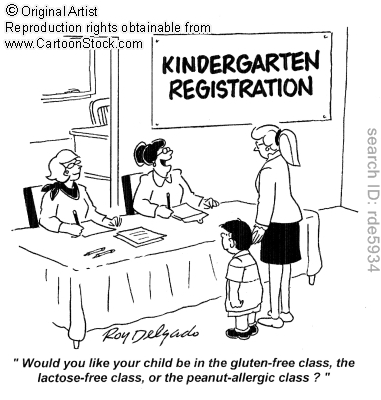570
 |
Have you ever gone to a kid’s birthday party and every time someone got up for the food table the host would go on with a list of what could be probable allergens in the dish? With kids today being allergic to perpetually everything (except junk food), throwing a birthday party may be the worst nightmare for any host! But all jokes apart, anyone would have noticed that the list of allergies seems to be getting more and more bizarre.
Our connection with microbes
Our tiff with the microbial world kick starts quite early in our neonatal life. When the fetus is growing inside its mother’s womb, it is protected from this microbial world. After it is born, it gets introduced into a different environment- one abundant in microbes. These microbes rapidly colonize the gut and respiratory tract, to the extent that at the cellular level they exceed human cells by ten times! But these microbes are actually beneficial to the human body. They provide a constant stimulus for the development and maturation of the immune system- especially the local inflammatory and antibody responses, in the early years.
So, a certain level of exposure to microbes is a natural and good thing. Turns out that scientist have long been studying the relation between the western, more urban lifestyle and the incidence of allergies and asthma. This theory is called the ‘Hygiene Hypothesis‘. And this may sound totally insane, but a hyper hygienic lifestyle may be the cause of the rising number of allergies in the world.
With our growing level of paranoia about ‘hygiene’ and our increasingly indoor lifestyle, children are getting less exposed to microbes that help train the immune system. The immune system does not receive the necessary stimuli for its proper maturation, making it less robust. The balance of the different immune cells and their products is disrupted which leads to allergies, making allergies, essentially, a dysfunction of the immune system. Improper fine-tuning of the immune response leads to mounting of a response against harmless environmental agents and these deadly responses also adversely affect our own cells.
This theory explains the increase in asthma and other allergic diseases as seen in developed nations and upper class urban families. What this means is that the higher standards of cleanliness have led to a decrease in spread of infections among members of a family and thus increased expression of atopic diseases. In other words, when children have infections in early childhood, transmitted due to unhygienic contact with siblings, they are less likely to develop allergies later in life.
Our lifestyle has changed drastically over the centuries. We have become more aware of our environment and have learnt to combat harmful and sometimes life threatening components of the natural world. From detergents, soaps and hand sanitizing gels to air purifiers, anti-bacterial and anti-microbial products, we have taken serious measures to keep these microbes at bay.
These measures may have helped us gain leverage over these bad germs, but are we really on the winning side of the battle??!!



1 comment
… [Trackback]…
[…] Read More Infos here: coffeetablescience.com/2013/01/26/allergies-and-the-hygiene-hypothesis/ […]…